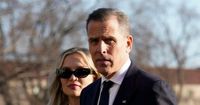Washington — On Monday, March 17, 2025, President Donald Trump made headlines by announcing the immediate revocation of Secret Service protection for Hunter and Ashley Biden, the children of former President Joe Biden. This controversial decision, posted on Trump's social media platform, Truth Social, has sparked debates over security protocols for former presidential families and the motivations behind such actions.
Trump stated, "Hunter Biden has had Secret Service protection for an extended period of time, all paid for by the United States Taxpayer. Please be advised, effective immediately, Hunter Biden will no longer receive Secret Service protection. Likewise, Ashley Biden, who has 13 agents, will be taken off the list." This move means approximately 30 agents responsible for the protection of the Biden siblings will now be reassigned.
Trump's decision arrives during heightened political tensions. Hunter Biden was reportedly vacationing in South Africa at the time, leading Trump to criticize both the expense to taxpayers and the appropriateness of such extensive protection. He remarked on the number of agents assigned, calling it "ridiculous" and questioning the necessity of such arrangements for the adult children of former presidents.
The Secret Service, through its Chief of Communications, Anthony Guglielmi, confirmed, "The Secret Service will comply and is actively working with the protective details and the White House to ensuring compliance as soon as possible." This compliance indicates Trump’s directives will be executed without delay, reflecting the typical protocol when any president revokes security measures.
Traditionally, Secret Service protection for the adult children of former presidents does not extend indefinitely. After leaving office, former presidents typically see their children’s protection come to an end; though both Trump and Biden had previously elected to prolong these protections temporarily upon exiting the White House. Biden had extended the detail for his children through July 2025 via executive order right before leaving, creating expectations about the continuity of their security.
Notably, former presidents and their spouses do receive lifetime Secret Service protection under federal law, but congressional guidelines suggest adult children over the age of 16 do not automatically qualify for continued coverage beyond their parents' presidency.
The political backdrop of Trump’s announcement is illuminated by past actions of revoking security clearances and protections for several individuals associated with the Biden administration. Earlier this month, Trump had already taken similar actions against former officials, including Secretary of State Antony Blinken and National Security Advisor Jake Sullivan, reflecting his administration's continued confrontation with Democratic leadership.
Political experts suggest this decision may be motivated by Trump's long-standing rivalry with the Biden family, which has been marked by allegations, personal attacks, and mutual calls for accountability. For example, Trump's animosity extends beyond mere political competition, as he has often publicly fixated on Hunter Biden, who was facing severe legal scrutiny before receiving a presidential pardon from Biden at the end of his term.
Trump’s disdain for the Biden children's continuing security also seems to have roots in his previous experiences, where he extended protections for his own children post-presidency. Just after leaving office, he granted additional security for Donald Jr., Ivanka, Eric, and Tiffany Trump, extending their protective details by six months, showcasing the contrasting stances these two administrations have taken toward similar issues.
Both sides of the political divide have reacted to Trump’s announcement. Supporters argue it aligns with accountability for the Biden family, reflecting the public sentiment surrounding Hunter Biden's past controversies and perceived privileges enjoyed under the previous administration. Critics, conversely, view it as part of Trump's vindictive streak, reflecting his penchant for leveraging political power against opponents and anyone associated with them.
Trump’s decision, juxtaposed against the current rising political climate and security risks, raises important questions about the treatment of families of former leaders. With political violence becoming more common, whether revoking such protection is wise remains hotly debated.
While addressing reporters at the Kennedy Center, Trump described the information about Hunter’s detail as something he was unaware of until prompted, stating, "I just heard about it for the first time. I’m going to take a look at it." His remarks suggest the decision may have been impulsive, and it remains to be seen how such rapid changes might impact the safety of those involved. This decision adds another layer to the complicated relationship between security and the political ramifications of executive power.
The developments surrounding Trump’s revocation of Secret Service detail for Hunter and Ashley Biden not only demonstrate the multifaceted nature of political rivalry but also exemplify how security measures are embedded within the fabric of American political life. Given the history of both Trump and Biden's presidencies, uncertainty looms over what wave of political fallout might arise next, ensuring this story is far from concluded.









